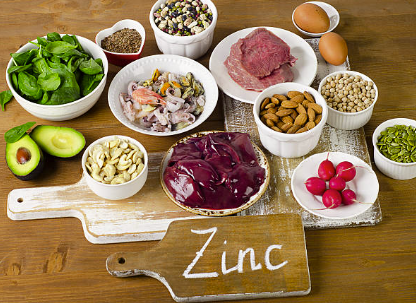Here are the benefits of Zinc Methionine:
*After pressing this button, you will be redirected to Coral Club’s official online
store, where the price of the product in your region, as well as its availability, will be indicated.
Coral Club membership program with a discount of 20% and more
Register for a discount card and receive - 20% forever
register
The biological role of Zinc has defined about 120 years ago. It is necessary for the operation of all body systems: for normal growth, reproductive function support, hematogenesis, taste perception and olfaction, normal wound repair processes, etc. It takes part in the work of hypophysis, pancreatic, and prostatic glands.
Zinc is a product with a unique range of health benefits. It’s indispensible for proper functioning of thymus and immune system; it prevents the development of immune deficiencies, has an anti-viral effect, maintains body’s hormonal balance; preventing the development of an enlarged prostate and skin diseases and is also very effective at treating acne.
Essential for normal growth and development: Zinc is essential for the proper growth and development of the body, particularly in children and adolescents. It plays a crucial role in cellular growth, division, and repair, contributing to overall physical development.
Supports reproductive function and fertility: Zinc is vital for reproductive health in both men and women. It plays a role in sperm production, ovulation, and fertilization, thus supporting fertility. In men, zinc is necessary for the production of testosterone, the male sex hormone, which is important for reproductive function.
Enhances taste perception and olfaction (sense of smell): Zinc plays a role in maintaining the senses of taste and smell. It is involved in the function of taste receptors on the tongue and olfactory receptors in the nasal passages, contributing to the perception of flavors and scents.
Facilitates normal wound healing processes: Zinc is essential for wound healing and tissue repair. It promotes collagen synthesis, which is crucial for the formation of new tissue and the closure of wounds. Zinc also helps regulate the inflammatory response and supports immune function at the site of injury.
Plays a role in the functioning of the pituitary, pancreatic, and prostatic glands: Zinc is involved in the function of various glands in the body, including the pituitary gland, which regulates hormone secretion, the pancreas, which produces insulin and aids in digestion, and the prostate gland, which produces prostatic fluid.
Crucial for the proper functioning of the thymus and immune system: Zinc is essential for the development and function of the immune system. It is required for the maturation and activation of immune cells, such as T cells and natural killer cells, and helps regulate immune responses to pathogens and foreign invaders.
Vital for hematopoiesis (formation of blood cells): Zinc is involved in the process of hematopoiesis, which is the formation of blood cells in the bone marrow. It is required for the production and maturation of various blood cells, including red blood cells, white blood cells, and platelets, thereby supporting overall blood health.
Prevents immune deficiencies and exhibits anti-viral effects: Zinc deficiency can lead to impaired immune function and increase the risk of infections. Zinc supplementation has been shown to enhance immune function and reduce the severity and duration of infections, including viral infections like the common cold and flu.
Helps maintain hormonal balance in the body: Zinc plays a role in regulating hormone levels and maintaining hormonal balance. It is involved in the synthesis and metabolism of various hormones, including insulin, thyroid hormones, and sex hormones like testosterone and estrogen.
Prevents the development of enlarged prostate and skin diseases: Zinc has been linked to the prevention of conditions like benign prostatic hyperplasia (BPH), a common condition characterized by an enlarged prostate gland. Additionally, zinc deficiency has been associated with skin disorders such as acne, and adequate zinc levels may help prevent or alleviate these conditions.
Effective in treating acne: Zinc has anti-inflammatory and antimicrobial properties that make it effective in the treatment of acne. It helps reduce inflammation, regulate sebum production, and inhibit the growth of acne-causing bacteria, making it a popular ingredient in acne treatments and skincare products.

Aids in managing depression and anxiety: Zinc plays a role in neurotransmitter function and brain health, and studies suggest that zinc deficiency may be linked to mood disorders like depression and anxiety. Supplementing with zinc has been shown to improve mood and reduce symptoms of depression and anxiety in some individuals.
Zinc is one of the most prevalent trace elements in the human body, primarily concentrated in bones and muscles but also present in skin, retina, brain, liver, pancreas, and prostate glands. It plays a crucial role in numerous biochemical reactions, influencing antioxidant protection, digestive processes, and the metabolism of proteins, fats, and carbohydrates. Additionally, zinc contributes to tissue regeneration, immune cell development, hemoglobin synthesis, and more.

Chelated zinc compounds, such as those with the amino acid methionine, help safeguard zinc from factors that hinder its bioavailability and enhance its absorption.
Chelated compounds, characterized by mineral compounds with organic molecules, typically amino acids, possess a unique structure that enhances stability and promotes absorption by the body.
Zinc gluconate, found in the product, represents a highly bioavailable form of zinc that the body readily absorbs, ensuring optimal utilization without adverse effects. This formulation adheres to stringent quality standards and is suitable for individuals of all age groups.
Natural sources of zinc include beef, liver, seafood, wheat germ, oatmeal, carrots, peas, spinach, and nuts. In adults, zinc is distributed across organs and tissues, with notably high concentrations in the prostate glands, sperm, skin, hair, muscles, and blood cells.
Zinc plays pivotal roles in cell division, T-cell immunity function, insulin production, and pancreatic function. Moreover, it aids in the absorption of vitamin E, regulating blood formation processes.
Furthermore, zinc is integral for skin regeneration, hair and nail growth, and the secretion of sebaceous glands, relying on proper protein synthesis.
Zinc also contributes to alcohol metabolism, and a deficiency may increase susceptibility to alcoholism.
When combined with vitamins A and B6, zinc exhibits a synergistic effect, bolstering overall health and well-being by supporting various physiological functions in the body.
